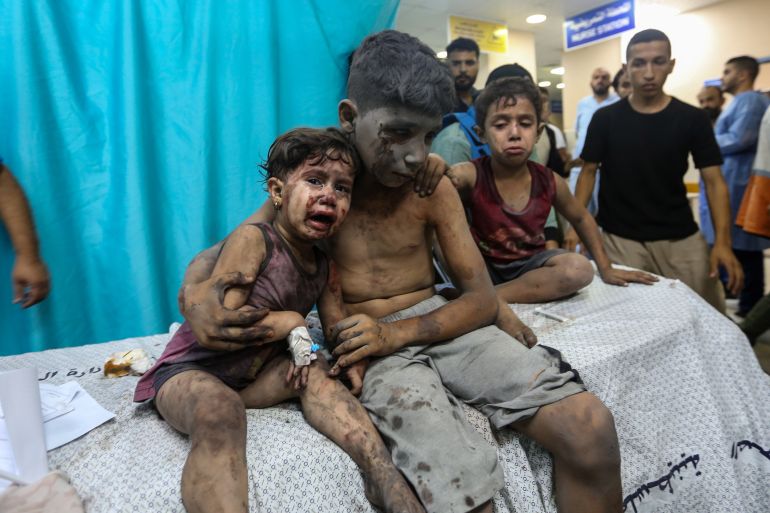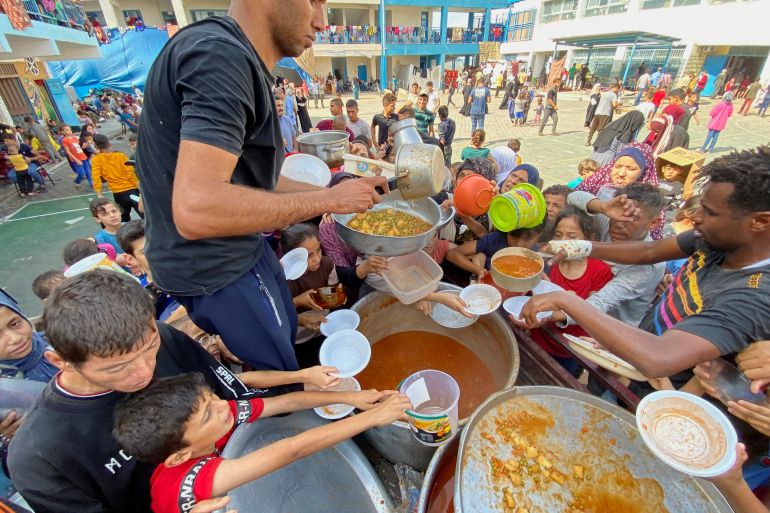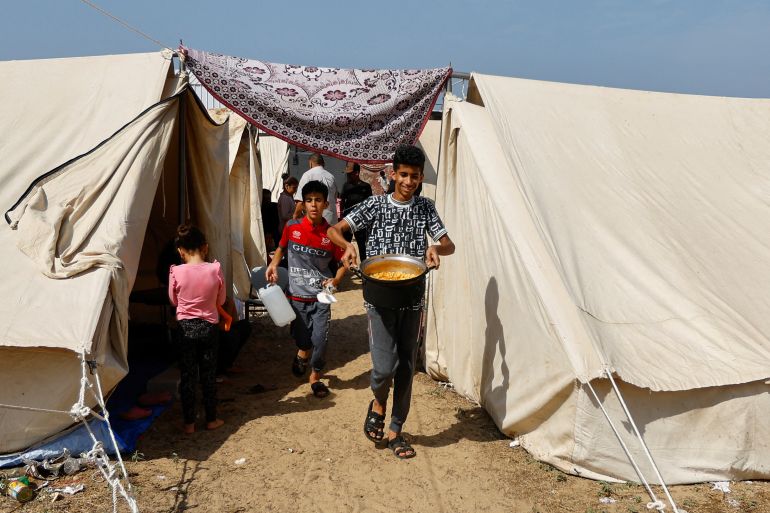From Checkpoint,
An international charity says a child is being killed every 13 minutes in Gaza - and is adding to international calls for an immediate ceasefire.
Reports from Gaza say 2300 children have been killed during Israel's counter attacks. Almost 5400 more children have been injured and 800 are believed to be missing under rubble.
These latest figures, reported by Save the Children, come from the Hamas-run Palestinian Health Ministry in Gaza and media reports, and it has been impossible to independently verify them.
Save the Children director for the Palestinian territory Jason Lee told Checkpoint the children were facing a "human catastrophe".
Lee said that the Gaza Strip was one of the most densely populated places on Earth, with nearly 2.3 million inhabitants - half of whom were children.
"These children are facing a human catastrophe - 1.4 million people have been displaced (and) ... have fled their homes."
They were trying to find shelter in schools, private homes and UN camps that were not equipped for that volume of people, he said.
"Some of them up have to 23,000 people in them... with (hardly any) bathrooms, no water, no wash facilities. The situation is dire - there's no healthcare for them."
Those hospitals that were still open were running out of medical supplies, he said.

A Red Crescent doctor tries to help an injured girl following an Israeli air strike on the Al-Amal neighbourhood, to the west of Khan Yunis. Photo: Saher Alghorra / Middle East Images / AFP
"They're being forced to do surgeries without any anaesthetic, with no electricity, and surgeons are forced to use their phones as flashlights."
There were up to 130 babies being intubated on the neonatal intensive care ward, but their lives were at risk with no electricity to keep essential equipment going.
"I cannot imagine the choices being faced by any nurse, any doctor as to which patient to treat because there are no supplies, no space, no electricity and no water," Lee said.
"A lot of them have fled to the south. I cannot imagine a parent having to move their children to keep them alive, while there are air strikes happening."
With very little water, there was a real danger of the rapid spread of gastrointestinal and communicable diseases, he said.
"We know that young kids are more vulnerable and susceptible to diarrhoea. This is on the rise... when you have situations where there is overcrowding in shelters, not enough water, no personal hygiene, it is going to spread. The sewage system is not working; raw sewage is pumping into the Mediterranean and overflowing into the streets."
The death toll will increase drastically unless life-saving equipment and fuel were delivered as part of aid convoys, he said.
"One child is now being killed every 13 minutes. Kids do not have time to wait."
Save the Children said an immediate ceasefire was "critical".
"This is the only way to keep children safe. There is constant shelling and air strikes - even in the south where people were told to evacuate to. This is why you have a huge number of children being killed and injured... there is no safe place in the south. There is nowhere for them to run."
UNICEF calls for unimpeded humanitarian access to the besieged Gaza Strip where 50 percent of the population is below the age of 18.

Published On 25 Oct 2023
The United Nations Children’s Agency (UNICEF) has decried the “staggering” number of children casualties in Gaza, where officials say Israeli bombardment has killed more than 2,000 minors.
Reporting that 2,360 children have been killed in less than three weeks, UNICEF called for an immediate ceasefire and sustained and unimpeded access for humanitarian assistance.
KEEP READING
Gaza’s kidney patients face dialysis crisis at jam-packed hospital
A further 5,364 children in Gaza have been injured in the “unrelenting attacks,” UNICEF added on Tuesday. More than 400 children are reportedly either killed or injured daily in the besieged Palestinian enclave, it said.
On October 7, Palestinian group Hamas launched surprise attacks on Israel, which killed more than 1,400 people. Israel’s army has since relentlessly bombed Gaza, killing at least 5,791 people. Children make up roughly 50 percent of Gaza’s population of about 2.3 million.
“The situation in the Gaza Strip is a growing stain on our collective conscience. The rate of death and injuries of children simply staggering,” said Adele Khodr, UNICEF regional director for the Middle East and North Africa.
“Even more frightening is the fact that unless tensions are eased, and unless humanitarian aid is allowed, including food, water, medical supplies and fuel, the daily death toll will continue to rise.”
Almost every child in the Gaza Strip has been exposed to deeply distressing events and trauma, marked by widespread destruction, relentless attacks, displacement, and severe shortages of daily necessities such as food, water, and medicine, UNICEF said.
The West Bank has also seen an “alarming surge in casualties”, the agency said. Twenty-eight children have been killed and at least 160 have reportedly sustained injuries.
UNICEF said 30 children were reported to have been killed in the recent violence in Israel, while dozens are still in captivity within Gaza after Hamas took about 220 people captive.
“The killing and maiming of children, abduction of children, attacks on hospitals and schools, and the denial of humanitarian access constitute grave violations of children’s rights,” said Khodr.
“UNICEF urgently appeals on all parties to agree to a ceasefire, allow humanitarian access and release all hostages. Even wars have rules. Civilians must be protected, children particularly, and all efforts must be made to spare them in all circumstances.”
UN chief Antonio Guterres also renewed calls for a ceasefire on Tuesday and said international law was being violated in the war between Israel and Hamas.
He said Palestinians “have been subjected to 56 years of suffocating occupation”, but Palestinian grievances do not justify Hamas’s attack.
At the same time, “those appalling attacks [by Hamas] cannot justify the collective punishment of the Palestinian people”, he continued.
‘The tip of the iceberg’
With the constant trauma of war and occupation, four out of five children in Gaza live with depression, grief and fear, according to a 2022 report by Save the Children. More than half of them struggle with suicidal thoughts and the trauma of witnessing the deaths of other children.
Last week, a Palestinian NGO said one child in Gaza is killed every 15 minutes in Israel’s ongoing bombardment. “We are witnessing a genocide in real time,” a spokesperson for the Defense for Children International – Palestine (DCIP) said.
Amid the war, education has been put on hold and schools are being used to shelter displaced people. Schools, like hospitals, have also suffered damage from the ongoing aerial attacks.
Israel blockaded the Gaza Strip after the Hamas attack, preventing food, fuel and regular aid from getting through. In the last week, a few dozen trucks carrying aid have been allowed in through the Rafah border crossing with Egypt, but NGOs say the supplies are not near enough.
The dire and pressing lack of water also poses grave consequences for children, UNICEF said on Tuesday, noting that most water systems have been severely affected or are nonoperational due to fuel shortages and damage to vital infrastructure.
UNICEF said fuel, which Israel has not allowed into Gaza, is of paramount importance for the operation of essential facilities such as hospitals, desalination plants, and water pumping stations. It also said neonatal intensive care units, some housing newborns in incubators, rely on mechanical ventilation, making an uninterrupted power supply a matter of life and death.
“Without humanitarian access, the deaths from attacks could be the tip of the iceberg,” said Khodr. “The death toll will increase exponentially if incubators start to fail, if hospitals go dark, if children continue to drink unsafe water and have no access to medicine when they get sick.”
SOURCE: AL JAZEERA AND NEWS AGENCIES
Important Opportunity to Speak Up for Justice
Balkees Jarrah

The International Criminal Court (ICC) is seen in The Hague, Netherlands
Horrific crimes are being committed with devastating consequences for civilians in the escalating hostilities between Israel and Palestinian armed groups. Impunity for past abuses has clearly contributed to today’s violations, which show no signs of abating. Despite this, governments have largely been silent about the critical role of the International Criminal Court (ICC), the one international entity already tasked with delivering impartial justice.
Not all countries are members of the ICC and crises marked by grave abuses are often beyond its remit. But while Israel is not a member, the State of Palestine is. The ICC prosecutor’s office has been investigating alleged serious crimes there since 2021.
On October 10, the United Nations Independent International Commission of Inquiry on the Occupied Palestinian Territory noted there was “clear evidence” of war crimes in Israel and Gaza and that it would be sharing information with relevant judicial authorities, especially the ICC.
Despite this, Human Rights Watch is aware of only three ICC member countries—Liechtenstein, Switzerland, and South Africa—that have made clear statements referring to the ICC and the current hostilities. Ireland’s foreign minister referenced the role of the court in media comments. For others, it appears the ICC may be the judicial elephant in the room.
All ICC members should urgently voice their support for the court’s role.
The response to date stands in stark contrast to other crises, including Ukraine, a non-ICC member country. After the full-scale Russian invasion in February 2022, the ICC prosecutor spoke out about the court’s critical role, and an unprecedented number of mostly European ICC member countries asked him to open a Ukraine investigation. Even the United States, another non-ICC member, has expressed strong support for the ICC's role in Ukraine.
The ICC prosecutor has not proactively issued a public statement reminding Israel and Palestinian armed groups of their obligations under international law and of the court’s mandate to investigate their actions. The court’s voice is urgently needed to help prevent further mass atrocities.
Double standards in victims’ access to accountability are unacceptable. On October 26, following a US veto of a UN Security Council resolution, the UN General Assembly will convene an emergency special session to consider the current hostilities. Will countries use that moment to raise their voices in favor of justice?
Starvation used as a ‘weapon of war’ on civilians in Gaza: Oxfam
Oxfam says about 104 trucks a day would be needed to deliver food to Gaza to overcome the crisis.
Palestinians gather to get their share of food offered by volunteers at a UN-run school in Rafah, in the southern Gaza Strip [Mahmoud al-Masri/Reuters]
Published On 25 Oct 202325 Oct 2023
Oxfam has renewed its call for essential goods to enter the besieged Gaza Strip and said starvation was being used as a “weapon of war” after Israel cut off supplies of food, water, electricity and fuel to the territory.


No comments:
Post a Comment